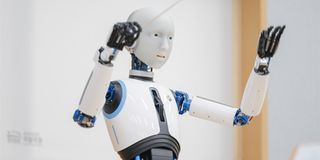Korea's first robot conductor offers glimpse into future of technology

EveR 6, an android robot developed by the Korea Institute of Industrial Technology / Courtesy of National Theater of Korea
What you need to know:
- After the country's first attempt by a robot to conduct an orchestra, its developer told The Korea Times that it was an effort to explore robots' potential to replace humans in areas traditionally reserved for humans and to reflect on human-robot coexistence
By Holly Chik
When a robot took the conductor's podium at the National Theater of Korea, a packed audience greeted the unusual maestro with an ovation. The locally developed robot led musicians of the country's national orchestra of traditional music in its debut performance, Friday.
After the country's first attempt by a robot to conduct an orchestra, its developer told The Korea Times that it was an effort to explore robots' potential to replace humans in areas traditionally reserved for humans and to reflect on human-robot coexistence.
"In the near future, the development of artificial intelligence (AI) and robot technology will lead to an era in which robots coexist with us in many areas of our lives," Lee Dong-wook, a principal researcher at the Korea Institute of Industrial Technology, said in a recent email interview with The Korea Times. "No matter how advanced AI technology is, I think it is difficult for robots to have creativity in fields such as art. Humans are born with emotions, but it is difficult to create robots with the same emotions as humans." He added that robots can serve as tools to aid human creativity.
The robot developer said the concert went smoothly without hiccups and he was satisfied with the audience response.
Humanoid robot EveR 6 bows to the audience after co-conducting a performance of the National Orchestra of Korea with conductor Choi Soo-yeoul, left, in Seoul, Friday. Courtesy of National Theater of Korea
EveR 6, the two-armed humanoid robot, is built with motion capture technology to mimic a conductor's fast movements with small electric motors in its joints. But the current automaton is not capable of modifying its movements in response to the actions of musicians or changes to the beat, according to Lee.
Friday's concert was divided into three parts: the first part was conducted by the robot, the second by "human conductor" Choi Soo-yeoul and the third by the two together.
Kim Bo-deul-saem, a flute musician who was on stage at the Friday concert, told The Korea Times after the performance that the human conductor has an edge over the robot.
"Throughout practices and rehearsals, the robot conductor wasn't able to make any demands on us and could only keep the beat like a metronome," said the musician who has been with the orchestra for seven years.
"The performers were busy keeping up with the robot's commands because it did not consider the players' breathing. It was also disappointing that we could not communicate with the conductor because the robot does not have communication abilities such as eye contact during the performance," she said.

Humanoid robot EveR 6 bows to the audience after co-conducting a performance of the National Orchestra of Korea with conductor Choi Soo-yeoul, left, in Seoul, Friday. Courtesy of National Theater of Korea
Among the audience members was Baek Bo-hyun, who holds a Ph.D. in culture and arts and works at the Korean Foundation for International Cultural Exchange. She said that she found the songs conducted by the human conductor "much more touching."
"EveR 6 has the advantage of being able to conduct quickly at a certain speed," she said. "But I felt that the conductor's core competencies, such as detailed facial expressions and gestures, his own interpretation of songs and formation of rapport with members, were significantly lacking compared to humans."

Robot EveR 6 is seen on a screen along with conductor Choi Soo-yeoul at a performance by the National Orchestra of Korea in Seoul, Friday. Courtesy of National Theater of Korea
Baek said the performance could be a starting point for robot conductors, a marked step in the co-evolution of technology and art.
Humanoid robot EveR 6 bows to the audience after co-conducting a performance of the National Orchestra of Korea with conductor Choi Soo-yeoul, left, in Seoul, Friday. Courtesy of National Theater of Korea
She pointed to a part of the performance where the robot collaborated with conductor Choi to guide the compositions together while standing next to each other.
"Choi expressed his emotions to the robot's awkward commands and solved it beautifully, drawing a future where humans and robots will be together. The format of this song felt more meaningful because it resembled 'sinawi,' one of the traditional Korean music methods that finally forms a symphony, after various traditional instruments continued to play randomly without a score," Baek said.
Lee Su-ho, a music student at the Seoul National University who also attended the show, said the performance featuring both conductors was innovative.
Humanoid robot EveR 6 bows to the audience after co-conducting a performance of the National Orchestra of Korea with conductor Choi Soo-yeoul, left, in Seoul, Friday. Courtesy of National Theater of Korea
"When the human and robot took the stage together, the human chose the players and the robot conducted. That was very interesting," said the student majoring in "daegeum," a large bamboo flute used in traditional Korean music.
The robot developer Lee said his team has started using generative AI technology to learn human motion data and generate behaviors for conversations or conducting.
"When the technology is mature, robots will be able to create appropriate gestures while talking to people and create conducting movements by reading scores. Since robots do not have the emotions that humans are born with, they are more likely to be used as supplementary tools for conductors or composers, rather than directly playing the roles in creative fields such as conducting and composing," he said.
This article was originally published on The Korea Times



